'Refugee men battering wives over food'
Feb 28, 2017
“On top of the little food, my husband sells some food to buy waragi and when I try to complain, he beats me up."

PIC: Women get their food rations at Bidibidi Refugee Camp in Yumbe district. (Credit: Andrew Masinde)
Tumalu Flora is a 27-year-old mother of seven. She and her family previously lived in the Central Equatoria State of South Sudan. They fled to Uganda to seek refuge following the recent wave of conflict in Juba that left their house burnt to ashes. However, life here hasn't been any better.
Since they were transferred to Bidi Bidi camp, Tumalu and her children live is a small tarpaulin. The family has not been able to build a makeshift house because she has no money to pay the builders. Her husband, according to her, only knows to drink local gin (waragi).
"When it rains, everything gets wet. We have nowhere to seek shelter. We sometimes use the blankets to cover ourselves," she says.
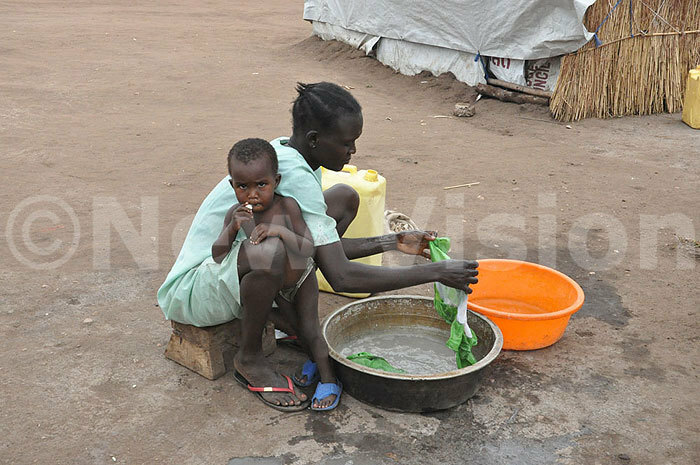
Camp life, for Tumalu (pictured above), is a painful experience in many ways.
The elements aside, the struggling mother is always battered by her husband whenever the food ration given to them runs out.
Inside the camp, a family receives grain, including maize and red sorghum grain along with a cup of vegetable oil and some other basic food items every month. But many refugees here don't like the red sorghum. They prefer the finer white sorghum.
Beans, a common protein, are also part of the food supplies.
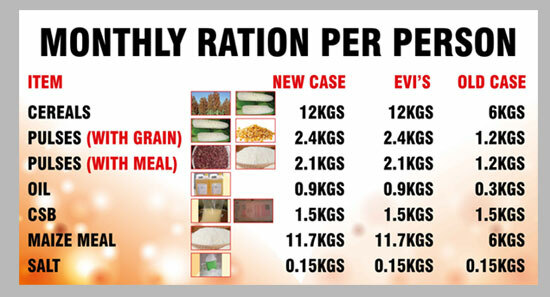
"Even the food ration is not enough for the whole month," says Tumalu.
"On top of the little food, my husband sells some food to buy waragi and when I try to complain, he beats me up. Sometimes when the food is over he asks for the food and when there is nothing to offer on the table he also beats me up."
Tumalu adds that while it is true that back in South Sudan women provide food for the family, men here in the camp still expect them to play that role even though the women clearly have no capacity to produce food.
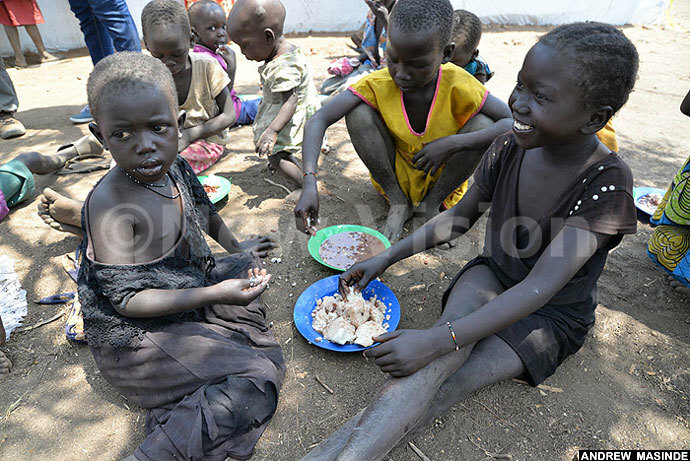
Men sell scarce food to buy alcohol
Like her, Wanjiko Mary, 23, is also a refugee in Bidibidi refugee settlement.
Her existence here is no different from Tumalu's - she is often battered by her husband whenever they run out of food. The mother of two says the food rations need to be increased and the men sensitized against domestic violence.
"When the food is over, it is me who suffers with the children. My husband sometimes beats me when he asks for the food and it is not there. Sometimes he sells the little food to buy local gin (waragi). I wish the food ration is increased."
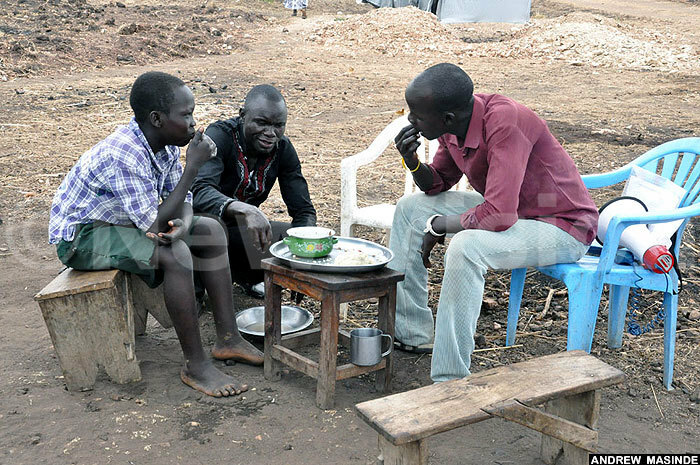
Tumalu and Wanjiko are among several other refugee women living in Bidibidi refugee settlement camp who are routinely battered by their husbands whenever food is no more.
A New Vision survey around the camp had many saying their husbands sell the food to non-refugees who have set up market stalls at the refugee settlements. In turn, the food is sold back to the refugees at inflated prices.
Alcohol turns the camp men into abuse spouses, beating their wives and sometimes children under the influence.
"How I wish government stops the sale of alcohol near the refugee settlements. Even those who sneak it in the camps should be arrested," says one of refugees.
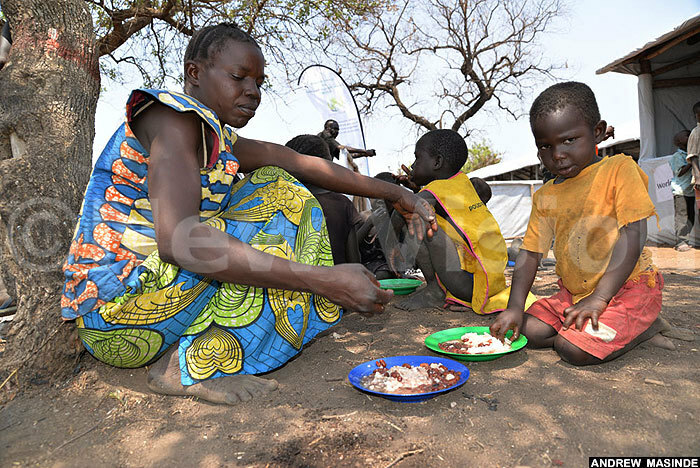
The largest part of the refugee camp population is of women and children
According to the UN's refugee agency UNHCR, the rate of new arrivals into Uganda remains very high, with a total of 9,568 South Sudanese refugees received between the 15th and 21st of February.
This statistic is however a decrease from the 13,092 new arrivals reported in the previous week, bringing the total February influx to 56,087. The average daily rate of new arrivals this week was 1,367.
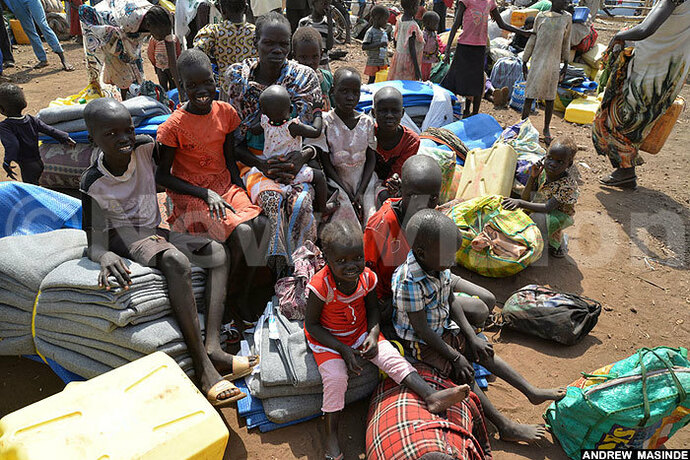
‘Production level too low'
UNHCR highlights that the refugees arriving in Uganda - majority are women and children - report general insecurity, limited access to food and basic services, violence, rape and abuse of women and girls, arbitrary detention and indiscriminate killing and destruction of property by armed forces as reasons for fleeing their homes in South Sudan.
Robert Baryamwesiga, Settlement Commandant at Bidibidi in Yumbe, says it is true there is a challenge of food in the camps because the food is too expensive and the funds for food are very limited. Even the local market can't adequately support the volumes of food needed to satisfy the refugee needs.
"In January and December we had to buy maize from Tanzania because they had enough supplies to supply the food. The production level is too low to provide enough food for the refugees."
"Government is in advanced stages to ensure that they provided land to refugee families and there are partners who are ready to support the refugees in not only better agronomical practices but also improved seeds," says aryamwesiga.
He adds that this will allow them have some reasonable amount of food besides the food rations. The plan is under way and they are only waiting for the rainy season.
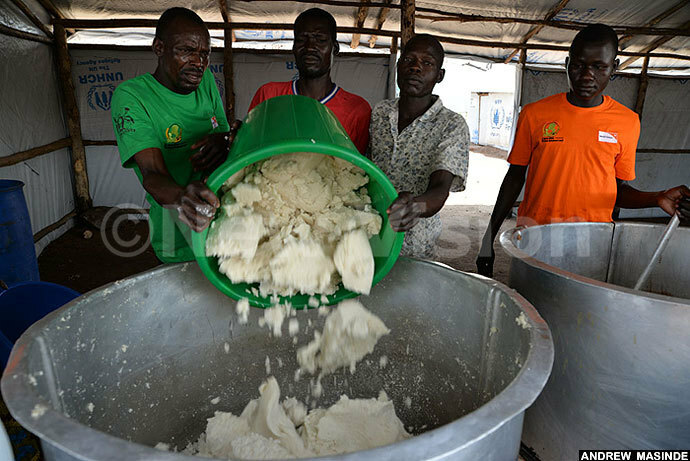
On the first day of their arrival at the camp, refugees get a cooked meal before getting their rations the following day
According to Gabriel Oling Olang, the World Vision response manager for West Nile, as one of the NGOs responsible for distributing food to the refugees in partnership with world food program (WFP), they have had challenges in providing food due to the ever increasing number of refugees.
Amid the obstacles, World Vision is doing all it takes to see that the food is enough.
Olang says each refugee is entitled to 2100 calories per day and that is what they get.
"We distribute food in five refugee settlements at 72 final distribution points and on a monthly basis an average of 9000 metric tons of food is distributed to close to 480, 000 refugees, and another 50,000 refugees receiving cash money in lieu of direct food."
